-
 Choral performance and clay pot tapping performance of the Twa refugee community of Katanning
Choral performance and clay pot tapping performance of the Twa refugee community of Katanning
The Twa people are a small ethnic group originally from Burundi who fled their homeland in the 1990s because of ethnic persecution. They lived in refugee camps in Tanzania for many years before being relocated to Australia as refugees. They have settled in Katanning to create a new life for themselves. A large part of their culture revolves around music and singing and they have formed the Burundi Band and Peace Choir. They are Christians and use the space at the local church and the old railway station to gather and perform, worship and practice. This record comprises:- sound recordings of performances of the TWA community choir and women community members playing clay pot musical instruments.
-
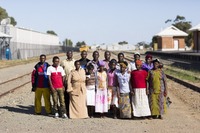 Burundi Band and Peace Choir, members of the Twa community, pose near the old train station, Katanning
Burundi Band and Peace Choir, members of the Twa community, pose near the old train station, Katanning
The Twa people are a small ethnic group originally from Burundi who fled their homeland in the 1990s because of ethnic persecution. They lived in refugee camps in Tanzania for many years before being relocated to Australia as refugees. They have settled in Katanning to create a new life for themselves. A large part of their culture revolves around music and singing and they have formed the Burundi Band and Peace Choir. They are Christians and use the space at the local church and the old railway station to gather and perform, worship and practice. This selection of photographs shows individuals, family and community groups in and around their homes, at church, at the local pool, in town, rehearsing and performing.
-
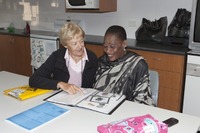 English class at Edmund Rice Centre, Mirrabooka.
English class at Edmund Rice Centre, Mirrabooka. Terry Farquarso (left) teacher and student Samai Mustafa. The Edmund Rice Centre Mirrabooka Inc. is a non-government, incorporated, not-for-profit, charitable organisation and a ministry of the Trustees of the Christian Brothers Oceania. The Edmund Rice Centre was established in March 1998 to support Humanitarian Entrants and Indigenous families through the provision of educational programs and community development activities.
-
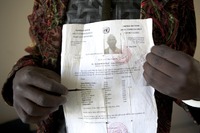 Dondon Malith's UNHCR refugee papers
Dondon Malith's UNHCR refugee papers Dondon Malith a Sudanese refugee also known as one of the “lost boys of Sudan”. Dondon has studied Politics and international Studies at Murdoch University in WA .
-
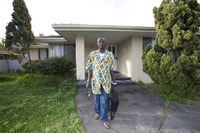 Sudanese refugee Dondon Malith at home in Balcatta
Sudanese refugee Dondon Malith at home in Balcatta Dondon Malith a Sudanese refugee also known as one of the “lost boys of Sudan”. Dondon has studied Politics and international Studies at Murdoch University in WA
-
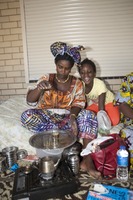 After the meal the women made traditional tea with mint, sugar and tea leaves
After the meal the women made traditional tea with mint, sugar and tea leaves The Senegalese Community of WA gather together on a fortnightly basis to meet and discuss any problems or issues within the community or in individual families. The community also share a meal together. Families take it in turn to host the event. I was invited to share a meal with the community. Women and men eat in separate areas. We ate traditional Senegalese food consisting of a fish, chilli and vegetable dish cooked with rice in a tomato stock. The food is eaten with one hand out of a communal bowl. After the meal was finished the women made some traditional tea with, mint and sugar and tea leaves. Tea was served to the men whilst they played cards. The women helped each other modify their wigs, which have been imported from Senegal. The clothing worn is also traditional clothing from Senegal. The men stopped for prayer after lunch. Saturday 29th September 2012. - Louise Whelan.
-
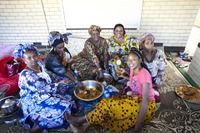 Women and men eat in separate areas, food is eaten with one hand from a communal bowl
Women and men eat in separate areas, food is eaten with one hand from a communal bowl The Senegalese Community of WA gather together on a fortnightly basis to meet and discuss any problems or issues within the community or in individual families. The community also share a meal together. Families take it in turn to host the event. I was invited to share a meal with the community. Women and men eat in separate areas. We ate traditional Senegalese food consisting of a fish, chilli and vegetable dish cooked with rice in a tomato stock. The food is eaten with one hand out of a communal bowl. After the meal was finished the women made some traditional tea with, mint and sugar and tea leaves. Tea was served to the men whilst they played cards. The women helped each other modify their wigs, which have been imported from Senegal. The clothing worn is also traditional clothing from Senegal. The men stopped for prayer after lunch. Saturday 29th September 2012. - Louise Whelan.
 Choral performance and clay pot tapping performance of the Twa refugee community of Katanning The Twa people are a small ethnic group originally from Burundi who fled their homeland in the 1990s because of ethnic persecution. They lived in refugee camps in Tanzania for many years before being relocated to Australia as refugees. They have settled in Katanning to create a new life for themselves. A large part of their culture revolves around music and singing and they have formed the Burundi Band and Peace Choir. They are Christians and use the space at the local church and the old railway station to gather and perform, worship and practice. This record comprises:- sound recordings of performances of the TWA community choir and women community members playing clay pot musical instruments.
Choral performance and clay pot tapping performance of the Twa refugee community of Katanning The Twa people are a small ethnic group originally from Burundi who fled their homeland in the 1990s because of ethnic persecution. They lived in refugee camps in Tanzania for many years before being relocated to Australia as refugees. They have settled in Katanning to create a new life for themselves. A large part of their culture revolves around music and singing and they have formed the Burundi Band and Peace Choir. They are Christians and use the space at the local church and the old railway station to gather and perform, worship and practice. This record comprises:- sound recordings of performances of the TWA community choir and women community members playing clay pot musical instruments. Burundi Band and Peace Choir, members of the Twa community, pose near the old train station, Katanning The Twa people are a small ethnic group originally from Burundi who fled their homeland in the 1990s because of ethnic persecution. They lived in refugee camps in Tanzania for many years before being relocated to Australia as refugees. They have settled in Katanning to create a new life for themselves. A large part of their culture revolves around music and singing and they have formed the Burundi Band and Peace Choir. They are Christians and use the space at the local church and the old railway station to gather and perform, worship and practice. This selection of photographs shows individuals, family and community groups in and around their homes, at church, at the local pool, in town, rehearsing and performing.
Burundi Band and Peace Choir, members of the Twa community, pose near the old train station, Katanning The Twa people are a small ethnic group originally from Burundi who fled their homeland in the 1990s because of ethnic persecution. They lived in refugee camps in Tanzania for many years before being relocated to Australia as refugees. They have settled in Katanning to create a new life for themselves. A large part of their culture revolves around music and singing and they have formed the Burundi Band and Peace Choir. They are Christians and use the space at the local church and the old railway station to gather and perform, worship and practice. This selection of photographs shows individuals, family and community groups in and around their homes, at church, at the local pool, in town, rehearsing and performing. English class at Edmund Rice Centre, Mirrabooka. Terry Farquarso (left) teacher and student Samai Mustafa. The Edmund Rice Centre Mirrabooka Inc. is a non-government, incorporated, not-for-profit, charitable organisation and a ministry of the Trustees of the Christian Brothers Oceania. The Edmund Rice Centre was established in March 1998 to support Humanitarian Entrants and Indigenous families through the provision of educational programs and community development activities.
English class at Edmund Rice Centre, Mirrabooka. Terry Farquarso (left) teacher and student Samai Mustafa. The Edmund Rice Centre Mirrabooka Inc. is a non-government, incorporated, not-for-profit, charitable organisation and a ministry of the Trustees of the Christian Brothers Oceania. The Edmund Rice Centre was established in March 1998 to support Humanitarian Entrants and Indigenous families through the provision of educational programs and community development activities. Dondon Malith's UNHCR refugee papers Dondon Malith a Sudanese refugee also known as one of the “lost boys of Sudan”. Dondon has studied Politics and international Studies at Murdoch University in WA .
Dondon Malith's UNHCR refugee papers Dondon Malith a Sudanese refugee also known as one of the “lost boys of Sudan”. Dondon has studied Politics and international Studies at Murdoch University in WA . Sudanese refugee Dondon Malith at home in Balcatta Dondon Malith a Sudanese refugee also known as one of the “lost boys of Sudan”. Dondon has studied Politics and international Studies at Murdoch University in WA
Sudanese refugee Dondon Malith at home in Balcatta Dondon Malith a Sudanese refugee also known as one of the “lost boys of Sudan”. Dondon has studied Politics and international Studies at Murdoch University in WA After the meal the women made traditional tea with mint, sugar and tea leaves The Senegalese Community of WA gather together on a fortnightly basis to meet and discuss any problems or issues within the community or in individual families. The community also share a meal together. Families take it in turn to host the event. I was invited to share a meal with the community. Women and men eat in separate areas. We ate traditional Senegalese food consisting of a fish, chilli and vegetable dish cooked with rice in a tomato stock. The food is eaten with one hand out of a communal bowl. After the meal was finished the women made some traditional tea with, mint and sugar and tea leaves. Tea was served to the men whilst they played cards. The women helped each other modify their wigs, which have been imported from Senegal. The clothing worn is also traditional clothing from Senegal. The men stopped for prayer after lunch. Saturday 29th September 2012. - Louise Whelan.
After the meal the women made traditional tea with mint, sugar and tea leaves The Senegalese Community of WA gather together on a fortnightly basis to meet and discuss any problems or issues within the community or in individual families. The community also share a meal together. Families take it in turn to host the event. I was invited to share a meal with the community. Women and men eat in separate areas. We ate traditional Senegalese food consisting of a fish, chilli and vegetable dish cooked with rice in a tomato stock. The food is eaten with one hand out of a communal bowl. After the meal was finished the women made some traditional tea with, mint and sugar and tea leaves. Tea was served to the men whilst they played cards. The women helped each other modify their wigs, which have been imported from Senegal. The clothing worn is also traditional clothing from Senegal. The men stopped for prayer after lunch. Saturday 29th September 2012. - Louise Whelan. Women and men eat in separate areas, food is eaten with one hand from a communal bowl The Senegalese Community of WA gather together on a fortnightly basis to meet and discuss any problems or issues within the community or in individual families. The community also share a meal together. Families take it in turn to host the event. I was invited to share a meal with the community. Women and men eat in separate areas. We ate traditional Senegalese food consisting of a fish, chilli and vegetable dish cooked with rice in a tomato stock. The food is eaten with one hand out of a communal bowl. After the meal was finished the women made some traditional tea with, mint and sugar and tea leaves. Tea was served to the men whilst they played cards. The women helped each other modify their wigs, which have been imported from Senegal. The clothing worn is also traditional clothing from Senegal. The men stopped for prayer after lunch. Saturday 29th September 2012. - Louise Whelan.
Women and men eat in separate areas, food is eaten with one hand from a communal bowl The Senegalese Community of WA gather together on a fortnightly basis to meet and discuss any problems or issues within the community or in individual families. The community also share a meal together. Families take it in turn to host the event. I was invited to share a meal with the community. Women and men eat in separate areas. We ate traditional Senegalese food consisting of a fish, chilli and vegetable dish cooked with rice in a tomato stock. The food is eaten with one hand out of a communal bowl. After the meal was finished the women made some traditional tea with, mint and sugar and tea leaves. Tea was served to the men whilst they played cards. The women helped each other modify their wigs, which have been imported from Senegal. The clothing worn is also traditional clothing from Senegal. The men stopped for prayer after lunch. Saturday 29th September 2012. - Louise Whelan.